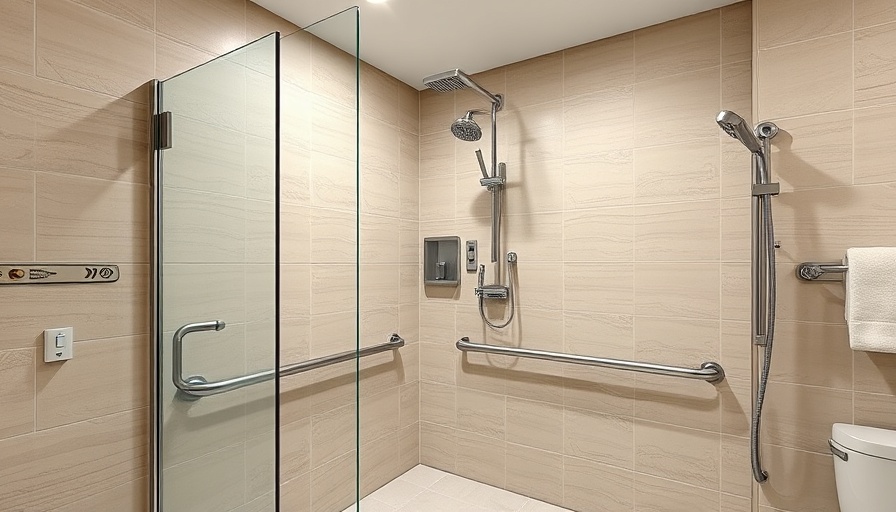
Understanding Barrier-Free Showers: A Step Towards Independence
As we navigate the challenges of aging, fostering independence becomes a crucial element in maintaining our quality of life. One area where this independence is increasingly relevant is in personal hygiene, particularly bathing. Barrier-free showers have emerged as a transformative solution that enhances safety while allowing seniors to maintain their dignity. These innovative designs are not just features in a bathroom; they promote a sense of control over personal care, which is invaluable.
Why Barrier-Free Showers Matter for Seniors
Barrier-free showers are specifically engineered with the senior's needs in mind. Their standout feature is the elimination of any thresholds or curbs, which can pose a significant risk of falls—a primary concern for those over 55. This design simplicity, often paired with non-slip flooring, ensures that seniors can enjoy their bathing experience without anxiety about potential accidents. The integration of grab bars further empowers users, helping them maintain balance and stability.
The Psychological Benefits of Independence
One of the most significant benefits of barrier-free showers is the psychological uplift they can provide. The ability to bathe independently without assistance fosters an essential sense of accomplishment. For many seniors, losing the capacity to perform self-care tasks can lead to feelings of helplessness. By enabling a safer and more accessible bathing experience, these showers can play a role in enhancing mental well-being—the very dignity and self-sufficiency so desired.
Customizing Your Shower Experience: What to Consider
The transition to a barrier-free shower isn't just about installation; it's about customization. Homeowners should take the time to assess their current bathroom setup and identify features that can enhance the showering experience. For example, adding adjustable showerheads, removable seating, or specialized lighting can dramatically improve usability. Consulting a professional who specializes in senior safety can provide personalized recommendations based on individual mobility needs.
Looking Ahead: Aging in Place and Accessibility Trends
The movement toward aging in place is gaining momentum, and the accessibility of our living spaces is at the forefront of this shift. As more people opt to age in their own homes, the demand for features like barrier-free showers will likely increase. Innovations in bathroom design are not limited to aesthetic appeal; they are rooted in the practical need for functionality. This trend offers a broader perspective on home modifications, advocating for inclusive spaces where individuals can thrive, regardless of age.
Practical Tips for Safe Bathroom Modifications
When considering a shift to a barrier-free shower, practical insights can help in making efficient modifications. Start with simple features like non-slip mats and handheld showerheads. These enhancements can be easily integrated with existing setups. Lighting improvements, such as brighter LED options or motion sensors, can also elevate safety. Remember, it’s not just about the shower itself; an overall bathroom renovation focusing on safety and aesthetics can significantly influence daily life quality.
Common Misconceptions About Barrier-Free Showers
Despite their many benefits, several myths surround barrier-free showers. A prevalent misconception is that such showers are only for individuals with severe mobility issues. In reality, many seniors can benefit from their ease of use, even if they don’t perceive themselves as having mobility challenges. Another misconception is that these showers lack style. On the contrary, barrier-free designs can be tailored to fit various aesthetic preferences, appealing to a wide range of homeowners.
The Importance of Lighting in Shower Safety
Good lighting is essential in preventing accidents during bathing. Adequate illumination allows seniors to see clearly, which lowers the chances of falls. Fixtures can be strategically placed to ensure that all areas of the shower are well-lit. Furthermore, sensor lights that activate upon entry can be particularly advantageous, providing the reassurance of visibility without the need for fumbling for a switch. This thoughtful consideration reflects an understanding of the unique challenges faced by older adults.
 Add Row
Add Row  Add
Add 




 Add Row
Add Row  Add
Add 

Write A Comment